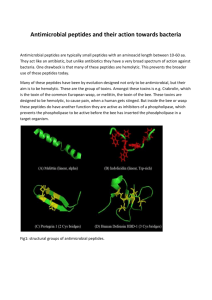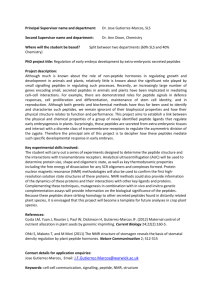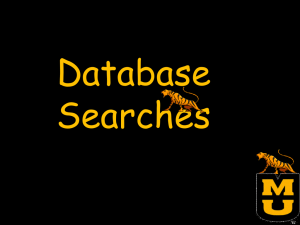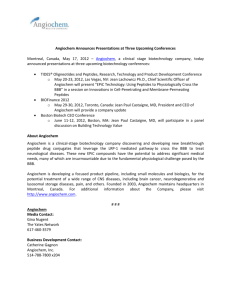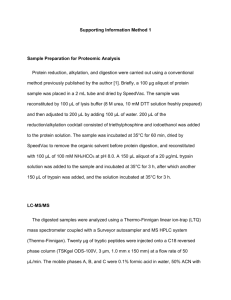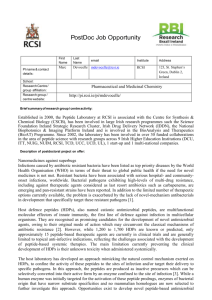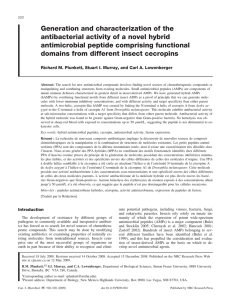BIOL 695-002/BIOS 704-002 Antibact Effects Innate Immun
advertisement
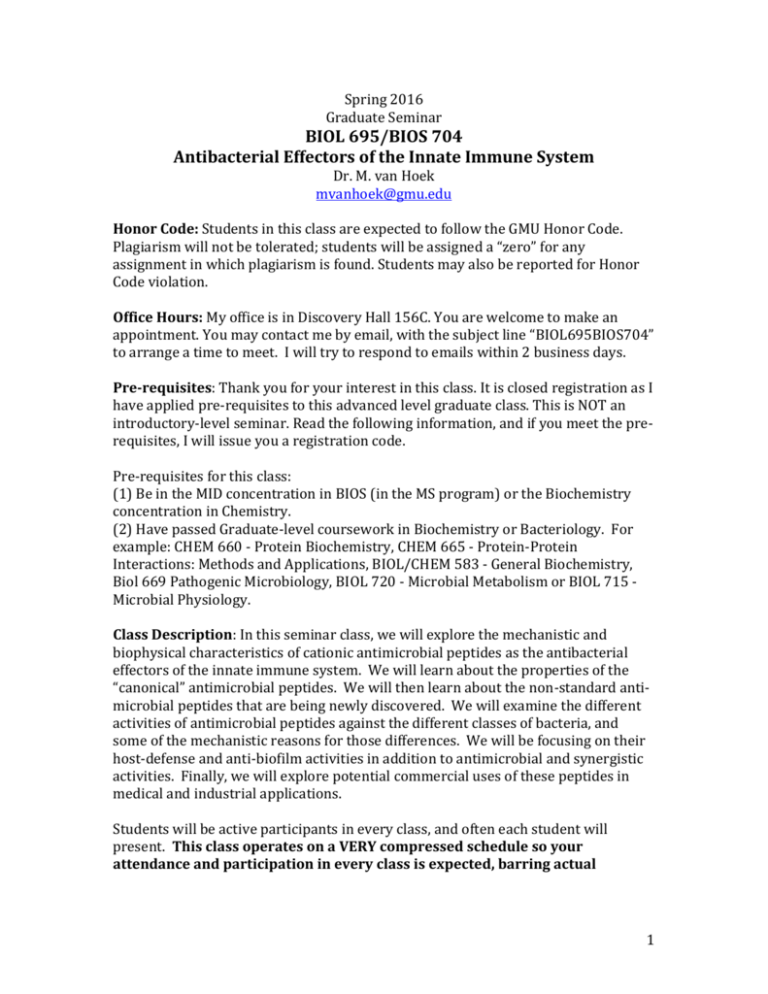
Spring 2016 Graduate Seminar BIOL 695/BIOS 704 Antibacterial Effectors of the Innate Immune System Dr. M. van Hoek mvanhoek@gmu.edu Honor Code: Students in this class are expected to follow the GMU Honor Code. Plagiarism will not be tolerated; students will be assigned a “zero” for any assignment in which plagiarism is found. Students may also be reported for Honor Code violation. Office Hours: My office is in Discovery Hall 156C. You are welcome to make an appointment. You may contact me by email, with the subject line “BIOL695BIOS704” to arrange a time to meet. I will try to respond to emails within 2 business days. Pre-requisites: Thank you for your interest in this class. It is closed registration as I have applied pre-requisites to this advanced level graduate class. This is NOT an introductory-level seminar. Read the following information, and if you meet the prerequisites, I will issue you a registration code. Pre-requisites for this class: (1) Be in the MID concentration in BIOS (in the MS program) or the Biochemistry concentration in Chemistry. (2) Have passed Graduate-level coursework in Biochemistry or Bacteriology. For example: CHEM 660 - Protein Biochemistry, CHEM 665 - Protein-Protein Interactions: Methods and Applications, BIOL/CHEM 583 - General Biochemistry, Biol 669 Pathogenic Microbiology, BIOL 720 - Microbial Metabolism or BIOL 715 Microbial Physiology. Class Description: In this seminar class, we will explore the mechanistic and biophysical characteristics of cationic antimicrobial peptides as the antibacterial effectors of the innate immune system. We will learn about the properties of the “canonical” antimicrobial peptides. We will then learn about the non-standard antimicrobial peptides that are being newly discovered. We will examine the different activities of antimicrobial peptides against the different classes of bacteria, and some of the mechanistic reasons for those differences. We will be focusing on their host-defense and anti-biofilm activities in addition to antimicrobial and synergistic activities. Finally, we will explore potential commercial uses of these peptides in medical and industrial applications. Students will be active participants in every class, and often each student will present. This class operates on a VERY compressed schedule so your attendance and participation in every class is expected, barring actual 1 emergencies and note the schedule change below. There will also be assigned work required in advance of every class in order to achieve this tight schedule. Class Schedule: Posted Schedule: Jan 19, 2016 - Feb 16, 2016, 4:30 pm - 7:10 pm, Wednesdays, Prince William: Bull Run Hall 249 Actual Schedule: Class Date Class Topic Special notes # 1. Jan 20th Overview of Cationic Come to class with your presentation Antibacterial Peptides. prepared on your assigned peptide. 2. Jan 27th Novel, non-canonical Come to class with your presentation antibacterial peptides. prepared on your assigned peptide. rd 3. Feb 3 Host-defense roles of Come to class with your presentation antibacterial peptides prepared on your assigned peptide. th 4. Feb 10 No Class ASM Biodefense Meeting 5. Feb 17th Anti-biofilm mechanisms of Come to class with your presentation antibacterial peptides prepared on your assigned peptide. th 6. Feb 24 Industrial applications and Required pre-reading: “Antimicrobial potential markets for peptides stage a comeback”. “Choose your antibacterial peptides. own topic” week. Written paper and capstone presentation required. 7. Mar Back-up class for snow days, See Week 6. 2nd or running over. Points Week 2 presentation Novel, non-canonical antibacterial peptides 10 Week 3 presentation Host-defense roles of antibacterial peptides 10 Week 5 presentation Anti-biofilm mechanisms of antibacterial peptides 10 Participation 10 Capstone Presentation & written assignment Industrial applications and potential markets for antibacterial peptides. Final grade: 98-100 A+ 87-89 B+ 77-79 C+ 93-97 90-92 A A- 83-86 80-82 B B- 70-76 65-69 <65 C CF 20 for presentation 40 for written assignment 2
